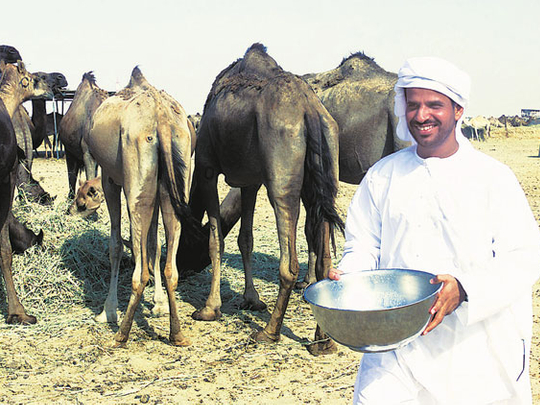
Beside the usual cartons of milk stacked up in the supermarket fridge, consumers might have noticed other cartons labelled ‘camel milk’.
With most supermarkets in the UAE now selling camel milk products, many consumers have started to wonder about their benefits and whether they can fall into their daily diets.
Gulf News talked to Dr Babu Shershad from the First Medical Centre located in Dubai who discussed the advantages of regularly consuming camel milk, recommending the products to people with specific conditions.
“Because camel milk is less allergenic than cow’s milk, it is highly recommended to people who suffer from auto-immune diseases,” said Dr Shershad.
“Studies have shown that camel milk is said to play a role in treating patients who suffer from food allergies whether adults or children. Unlike other types of milk, camel milk does not contain Beta-lactoglobulin, the major protein found in cow’s or sheep’s milk,” he added.
“When you compare the types of milk across the spectrum, you will find that camel milk contains 10 times the amount of iron found in cow’s milk and five times the amount of vitamin C,” explained the doctor.
Camel milk which is slightly saltier than cow’s milk is also low in fat and contains unsaturated fatty acids. “It has two per cent fat and a higher ratio of omega 3 to omega 6,” he added.
With camel milk being more wholesome than other types of milk, many nutritionists consider it a “complete milk,” he said. “Filling all the nutrient requirements, camel milk is also consumed raw as its unpasteurised,” he added, pointing out that it is therefore not heat-treated to kill the organisms found in it.
Besides people who are suffering from allergies, camel milk is also recommended to autistic children.
According to a theory, autistic children who have switched over from cow’s milk to camel’s milk, are said to have experienced a change in their symptoms, explained Shershad. The theory is said to be related to the absence of the allergic stimulation caused when drinking cow’s milk.
Another group of people that are recommended to drink camel milk are elderly patients.
“Those who are eating through feeding tubes should consume camel milk as it has a higher nutritional value with less volume,” said Dr Shershad.
Along with specific patients, Dr Shershad also recommends camel milk on a daily basis to those seeking a healthy diet.
Other products like camel yoghurt and camel ice cream are also considered to contain the same nutritious properties. “Camel milk products have anti-bacterial and anti-viral properties and can help those who are recovering from stomach bugs and infections,” said Shershad.
Camel Milk in the UAE
With sales of camel milk products in grocery stores across the UAE now becoming commonplace, camel dairies are enjoying higher demand for their products.
Al Ain Farms for Livestock Production, who started their production in 2001, said demand in the UAE is growing.
Abdullah Saif Al Darmaki, the CEO of Al Ain Dairy said that the demand for camel milk has been increasing across the region as many Emiratis prefer to include camel milk as it’s a part of the traditional diet.
Developing their products for over a decade, Al Ain Dairy now produces fresh as well as flavoured camel milk and yoghurt. The flavours of camel milk now include milk with dates, saffron, cardom, rose, and chocolate. Ice cream made with pure camel milk based ingredients is also another product that was recently released into the market
“We get the milk from camels in the UAE which produce 10 litres of milk a day,” said Hamad Al Subousi , Camel Farm Manager of Al Ain Dairy.







